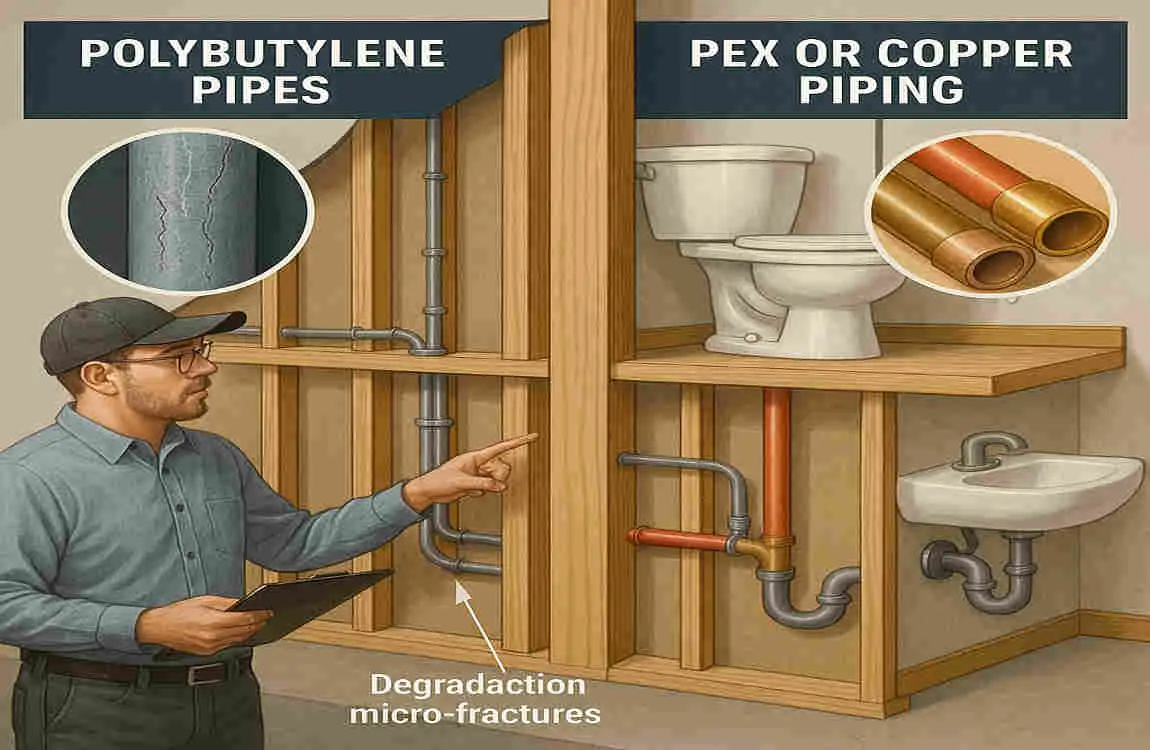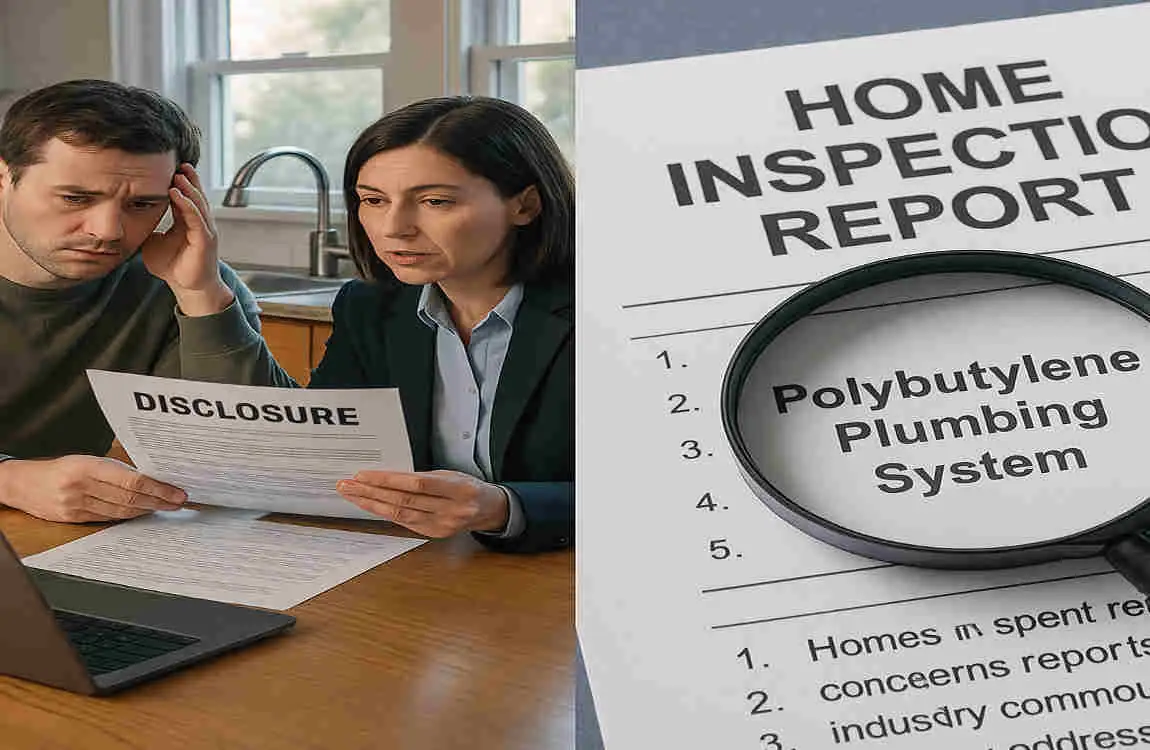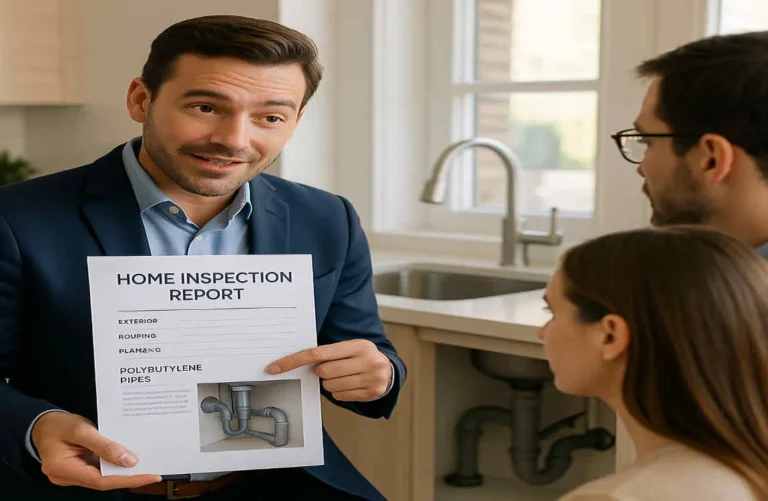Hey there, homeowners! Today, we’re tackling a tricky topic: selling a house with polybutylene pipes. If you’re scratching your head wondering what the heck those are, don’t worry – we’ve got you covered. Polybutylene pipes were a popular plumbing material used in homes built between 1985 and 1997. They seemed like a great idea at the time (cheap and easy to install), but fast forward a few decades, and these pipes have become a real headache for homeowners.
What Are Polybutylene Pipes and Why Are They Controversial?

Alright, let’s start with the basics. Polybutylene pipes (or PB pipes for short) are a type of plastic piping that was popular in the late 1980s and early 1990s. Builders loved them because they were inexpensive and easy to install compared to traditional copper pipes. Sounds great, right? Well, not so fast.
Fast forward a few years, and these pipes began to reveal their true nature. They had a tendency to crack and leak, especially when exposed to chlorine in the water supply. Cue the dramatic music: water damage, costly repairs, and a whole lot of frustrated homeowners.
As if that wasn’t bad enough, these leaky pipes led to a flurry of lawsuits and insurance headaches. Suddenly, having PB pipes became a big red flag for potential buyers and lenders alike. Talk about a plumbing plot twist!
How Polybutylene Pipes Affect Home Selling
Now, let’s discuss how these pesky pipes can put a damper on your home-selling dreams. First off, let’s face it – no buyer wants to inherit a plumbing nightmare. The mere mention of PB pipes can send potential buyers running for the hills.
You may also read (how to prevent ticks from infesting your home).
Home inspectors are like detectives when it comes to sniffing out polybutylene plumbing. They’ll flag it in their reports, and sellers are legally obligated to disclose it. Lenders become a bit jittery about approving mortgages for homes with these pipes, and insurance companies may increase premiums or even refuse coverage.
The kicker? Even if your pipes seem fine now, there could be hidden deterioration lurking beneath the surface. This uncertainty can make buyers nervous, leading to low-ball offers, lengthy negotiations, or even deal-breakers.
Can You Sell a House with Polybutylene Pipes? Yes, But…
Okay, take a deep breath. Yes, you can legally sell a house with polybutylene pipes. However, there’s a big “but” coming up.
Honesty is always the best policy when it comes to selling a home. Disclosure laws vary by state, but it’s always wise to be upfront about any known issues, including PB pipes. You’ll need to disclose potential risks, such as leaks and water damage.
Now, here’s where things get a bit sticky. Some buyers may become hesitant and attempt to negotiate a lower price or request repair contingencies. Others might walk away altogether. But don’t lose hope! Many buyers will still consider homes with PB pipes if they’re well-informed and the price reflects the issue.
Two Main Strategies for Selling a House with Polybutylene Pipes
Sell “As-Is” with Full Disclosure
One option is to sell your home “as-is,” warts and all. This means you’re upfront about the polybutylene pipes and let buyers know they’re getting the house in its current condition.
Pros:
- Quick sale (if priced right)
- No upfront replacement costs for you
Cons:
- Lower sale price
- Limited buyer pool (mostly investors or DIY enthusiasts)
To make this strategy work, you’ll need to price your home competitively. Look at comparable homes with similar plumbing issues to gauge the market. In your marketing, target investors and handy buyers who aren’t afraid of a fixer-upper.
Replace the Polybutylene Pipes Before Selling
If you have the budget and time, replacing those pesky PB pipes before listing your home can be a game-changer. You’ll need to replace them with modern materials, such as PEX or copper.
You may also read (understanding home kitchen faucet thread sizes for diy projects).
Pros:
- Attracts a broader range of buyers
- Fewer financing and insurance hurdles
- Potentially higher sale price
Cons:
- Upfront cost and time investment
If you choose this route, be sure to document the pipe replacement process and use it as a selling point in your marketing efforts. Buyers will appreciate the peace of mind that comes with brand-new plumbing.
Disclosure and Legal Considerations When Selling a Home With Polybutylene Pipes

Alright, let’s talk legal stuff. When it comes to selling a home with polybutylene pipes, honesty isn’t just the best policy – it’s the law. Failing to disclose known plumbing issues can land you in hot water (pun intended) with lawsuits and legal headaches down the road.
Ensure your property disclosure forms include all the necessary details about your PB pipes. Be prepared to answer buyer questions and provide documentation from any inspections or repairs that have been conducted.
Disclosure requirements can vary by state, so it’s always a good idea to double-check with your real estate agent and legal advisors to make sure you’re dotting your i’s and crossing your t’s.
Pricing Tips and Market Positioning
Pricing a home with polybutylene pipes can be tricky, but not impossible. Begin by examining comparable homes in your area that have faced similar plumbing issues. This will give you a ballpark idea of what buyers are willing to pay.
To sweeten the deal, consider offering repair credits or concessions during negotiations. Highlighting any recent upgrades or renovations can also help offset buyer concerns about the pipes.
When it comes to appraisals and lenders, be prepared to justify your pricing and provide all the necessary disclosures. Working with experienced real estate pros who know how to navigate these challenges can be a big help.
Marketing Your Home When It Has Polybutylene Pipes
Just because your home has polybutylene pipes doesn’t mean you can’t showcase its best features. Hire a professional stager and photographer to showcase your home at its best, both online and in person.
When crafting your listing description, be honest about the plumbing situation, but also highlight the potential for upgrades and renovations. You might even target your marketing towards buyers who are specifically looking for a fixer-upper project.
Consider working with real estate agents who have experience selling homes with similar issues. They’ll have the know-how and network to market your home effectively.
You may also read (7 best neighborhoods for houses in quezon city).
